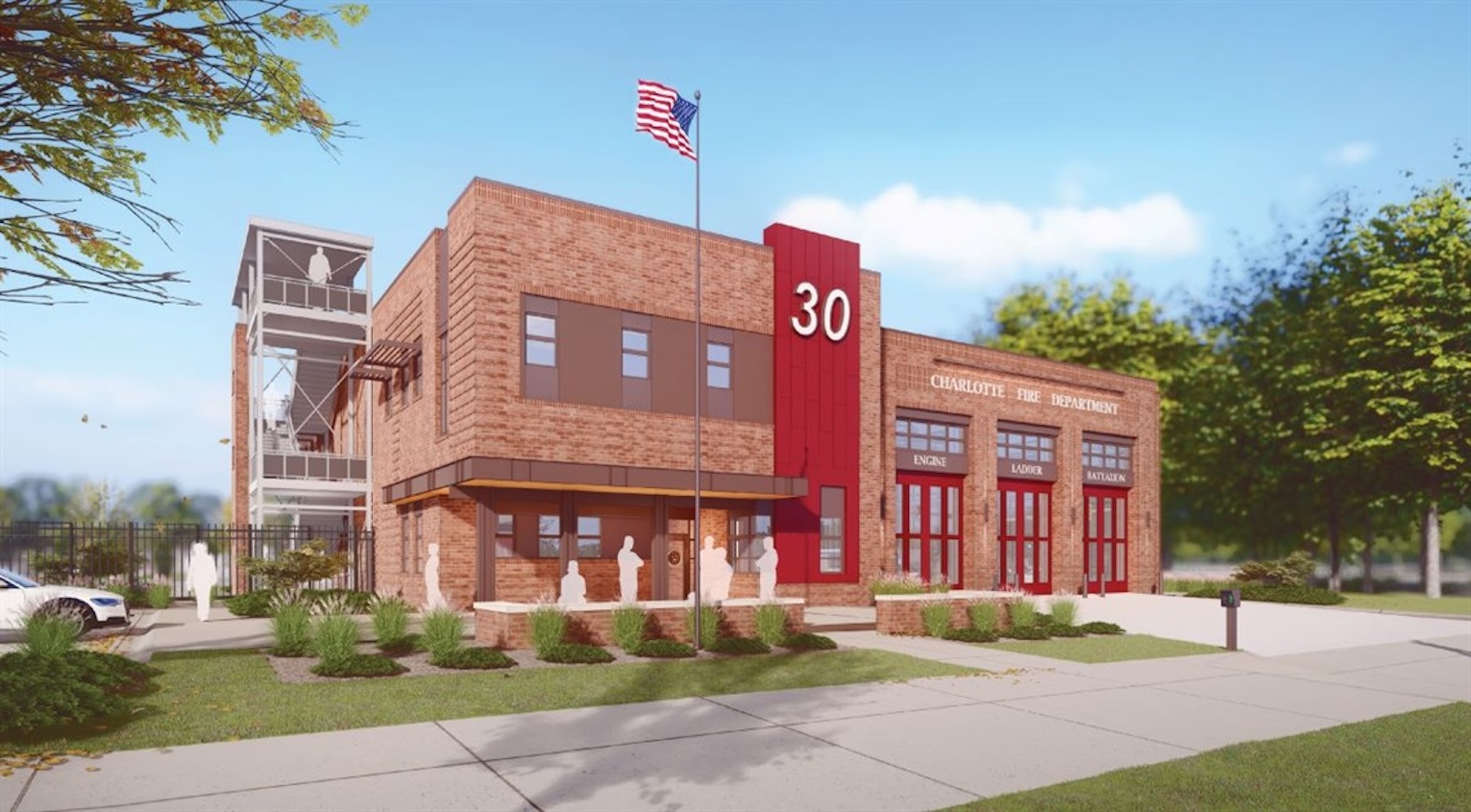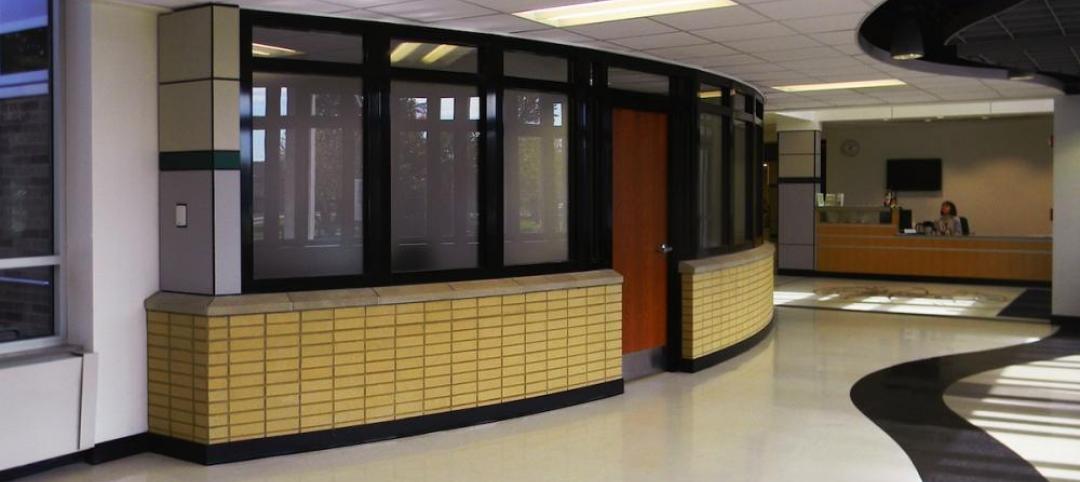Charlotte, N.C.’s new Fire Station #30 will be one of the country’s first all-electric fire stations, using no outside energy sources other than diesel fuel for one or two of the fire trucks. Multiple energy sources will power the station, including solar roof panels and geothermal wells. The two-story building features three truck bays, two fire poles, dispatch area, contamination room, and gear storage.
The $16.4 million, 14,000 sf station will be completed next fall. It will replace the original Station #30, a 1950’s-era residential home that was converted to a fire station in 1991. The new two-story building includes a fitness area with locker rooms, a kitchen and dining facility, a day room lounge, and offices for the captain and battalion chief. The second floor houses sleeping quarters and additional lockers and restrooms.
Geothermal wells will supply air conditioning as well as energy-efficient floor heating. Electric vehicle charging stations will charge the electric fire truck with additional wiring installed for future EV chargers. The site will also include two EV parking stations for employee cars.
RELATED STORY
Modular fire station allows for possible future reconfigurations
Core and shell construction includes the installation of new storefront systems of wall paneling and brick siding. A parking lot along with landscaping that includes tree planting is also part of the program. Throughout the project, general contractor Swinerton plans to use OpenSpace job site capturing, BIM 360 project collaboration, and drones to document construction.
Owner: City of Charlotte
Developer: Swinerton
Design architect/ Architect of record: ADW Architects
MEP engineering
Mechanical: Action Mechanical Contractors Inc.
Electrical: Stelco Electric LLC.
Plumbing: Peters Pipers Inc.
Structural engineer: Stewart Engineering
Here is the full press release from Swinerton:
Swinerton, an industry-leading commercial general contractor with offices nationwide, announces the construction of Charlotte Fire Department Station #30, one of the first all-electric fire stations in the United States. The $16.4 million build sets a new standard for public and civic spaces across North Carolina. Construction of the 14,000-square-foot project is underway and slated to be complete fall 2025.
“Sustainability tops the list of priorities at Swinerton,” explains Kevin Smith, Vice President, Division Manager, Swinerton’s Carolinas Division. “This new fire station, which will use no outside energy sources other than diesel fuel for one or two of the gas-powered fire trucks, is a testament to Charlotte’s commitment to its Strategic Energy Action Plan. We hope this is the first of many partnerships with the City of Charlotte to support its pursuit of this exceptionally important goal.” Initiated in June 2018, the city resolution strives to have its fleets and facilities be fueled by 100 percent zero-carbon sources by 2030.
Located at 3019 Beam Rd. on approximately three acres in southwest Charlotte, directly across from the city’s police and fire training academy, the all-electric fire station replaces the original Station #30, a 1950’s-era residential home that was converted to a fire station in 1991. Designed by ADW Architects, the new two-story building features three truck bays with accessibility from two fire poles, a dispatch area, decontamination room and gear storage. Additional amenities include a fitness area with locker rooms, a kitchen and dining facility, a day room lounge and offices for the captain and battalion chief. The second floor houses the sleeping quarters and additional lockers and restrooms.
Multiple energy sources will power Station #30. Solar roof panels are set to power the station while geothermic wells will supply air conditioning as well as energy-efficient floor heating. Electric vehicle charging stations will charge the electric fire truck with additional wiring installed for future EV chargers. The site will also include two EV parking stations for employee cars. The city plans to seek LEED® Silver certification as a showpiece for all future public buildings. “These sustainable measures promise a tangible reduction in operational carbon emissions compared to existing fire stations,” adds Smith.
As general contractor, Swinerton is providing ground-up construction services that include pre- and post-construction site work as well as core and shell construction that includes the installation of new storefront systems of wall paneling and brick siding. A parking lot along with landscaping that includes tree plantings, concludes the construction project. Throughout the project, Swinerton plans to use some of the many technologies in its arsenal, including OpenSpace job site capturing, BIM 360 project collaboration and drones to document construction.
Since expanding to the Southeast in 2018, the Carolinas Division has constructed nearly $400 million of commercial environments. The dedicated team of 90 construction leaders specializes in corporate interiors and buildings, healthcare, education, restaurants and hospitality, multifamily and mass timber construction.
Related Stories
| Jun 3, 2013
Construction spending inches upward in April
The U.S. Census Bureau of the Department of Commerce announced today that construction spending during April 2013 was estimated at a seasonally adjusted annual rate of $860.8 billion, 0.4 percent above the revised March estimate of $857.7 billion.
| May 23, 2013
Are design-build contracts killing small architecture firms?
Are federal design-build contract laws unfair to small firms? AIA thinks so, citing an interesting fact: an architecture firm spends a median of $260,000 to compete for a design-build project.
| May 21, 2013
7 tile trends for 2013: Touch-sensitive glazes, metallic tones among top styles
Tile of Spain consultant and ceramic tile expert Ryan Fasan presented his "What's Trending in Tile" roundup at the Coverings 2013 show in Atlanta earlier this month. Here's an overview of Fasan's emerging tile trends for 2013.
| May 16, 2013
Chicago unveils $1.1 billion plan for DePaul arena, Navy Pier upgrades
Hoping to send a loud message that Chicago is serious about luring tourism and entertainment spending, Mayor Rahm Emanuel has released details of two initiatives that have been developing for more than a year and that it says will mean $1.1 billion in investment in the McCormick Place and Navy Pier areas.
| May 3, 2013
'LEED for all GSA buildings,' says GSA Green Building Advisory Committee
The Green Building Advisory Committee established by the General Services Administration, officially recommended to GSA that the LEED green building certification system be used for all GSA buildings as the best measure of building efficiency.
| May 1, 2013
Groups urge Congress: Keep energy conservation requirements for government buildings
More than 350 companies urge rejection of special interest efforts to gut key parts of Energy Independence and Security Act
| Apr 30, 2013
Tips for designing with fire rated glass - AIA/CES course
Kate Steel of Steel Consulting Services offers tips and advice for choosing the correct code-compliant glazing product for every fire-rated application. This BD+C University class is worth 1.0 AIA LU/HSW.
| Apr 30, 2013
First look: North America's tallest wooden building
The Wood Innovation Design Center (WIDC), Prince George, British Columbia, will exhibit wood as a sustainable building material widely availablearound the globe, and aims to improve the local lumber economy while standing as a testament to new construction possibilities.
| Apr 24, 2013
North Carolina bill would ban green rating systems that put state lumber industry at disadvantage
North Carolina lawmakers have introduced state legislation that would restrict the use of national green building rating programs, including LEED, on public projects.
| Apr 24, 2013
Los Angeles may add cool roofs to its building code
Los Angeles Mayor Antonio Villaraigosa wants cool roofs added to the city’s building code. He is also asking the Department of Water and Power (LADWP) to create incentives that make it financially attractive for homeowners to install cool roofs.

















